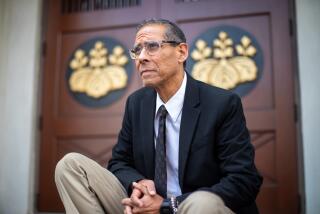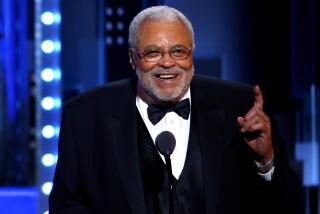Cryonics Lab Battles Family Over Client’s Will
- Share via
While Richard C. Jones’ body lay suspended in a tank of liquid nitrogen at a warehouse in Riverside on Tuesday, a bitter tug-of-war commenced in Los Angeles Superior Court over the Emmy-winning television producer’s deathbed decision to change his will, cutting by half the $10-million legacy he had previously left to a cryonics laboratory.
In 1987, Jones, who worked under the name of Dick Clair, set up a will and trust to give his $1-million Toluca Lake estate and residuals from hit televisions shows, including “It’s a Living,” to the Alcor Life Extension Foundation of Riverside, which freezes bodies in hopes of reviving them at some future date.
Then, on Dec. 9 as he lay dying from an AIDS-related illness at Sherman Oaks Community Hospital, Jones amended the will, which was taken to the hospital by a friend, to evenly divide his estate and trust between Alcor and his sister, nieces and nephews. Jones died two days later at age 57 and, following his request, his body was frozen in Alcor’s storage facility.
Will Contested
Alcor is contesting the revised will, arguing that Jones was mentally incompetent at the time the new will was signed.
“In 1987, Jones put into place the most carefully written will imaginable,” Alcor lawyer David Epstein said in an interview Tuesday. “In this case, when he got to the point where he was no longer mentally capable to make such a decision, people came to the hospital late at night and forced him to change it.”
Tuesday’s hearing was to determine whether Jones’ writing partner of 25 years, Jenna McMahon, should continue to administer his estate pending a trial later on the validity of the will and trust.
After hearing arguments, Judge Mariam A. Vogel rejected Alcor’s effort to displace McMahon with a court-appointed trustee.
“This evidence doesn’t come close to persuading me. . . . He (Jones) was absolutely competent to do it (change the will),” Vogel said.
Ron Palmieri, the lawyer representing McMahon, said in an interview that “medical evidence, witness testimony and statements from the attending physician all say he was competent to change his will. Only Alcor says he was not competent.”
Palmieri said Jones decided to change his will after he discovered that he had “substantially more residuals coming than he originally believed and he wanted to share with his family.”
Alcor is taking a risk by pursuing the case because the second will includes a provision to have the cryonics organization cut out altogether should it challenge the document.
“If they (Alcor) violate the no-contest provision, they get nothing,” Palmieri said. “Otherwise, they could get $5 million.”
Alcor’s lawyers repeatedly argued Tuesday that Jones was unfit to change his will, and challenged depositions, and statements by at least eight friends and family members who visited Jones in the hospital, which declared him of sound mind.
“He had AIDS dementia, which affected his thinking . . . high fever, and severe mouth lesions, which made it difficult for him to speak,” Alcor lawyer Epstein told Vogel. “He couldn’t remember if he was in the hospital . . . or where his passport was.”
Vogel, however, shrugged off such arguments as insignificant.
“I can’t remember where my passport is either,” she said. “What does that prove?”
Jones, a three-time Emmy Award-winning television producer-writer who worked on programs including “The Carol Burnett Show” and “Flo,” was a devoted supporter of Alcor and its cryonics research.
The Alcor Life Extension Foundation stores frozen heads and bodies in the hope that in the future they can be revived and new bodies cloned for them. Most scientists dismiss cryonics as fantasy.
Alcor founder Saul Kent, 47, whose 83-year-old mother’s head has been suspended in liquid nitrogen at the Alcor facility, said in an interview Tuesday that Jones had three reasons for wanting to turn over his entire estate to Alcor.
Kent said Jones hoped the money would be used to ensure that his frozen body remain preserved, to fund cryonics research “and to pay for his return.”
“The family’s position is that it desires that Jones’ last desires be carried out,” said Arthur Grebow, the lawyer representing Jones’ family in the case. “We view Kent’s position as a sham.”
More to Read
The complete guide to home viewing
Get Screen Gab for everything about the TV shows and streaming movies everyone’s talking about.
You may occasionally receive promotional content from the Los Angeles Times.







